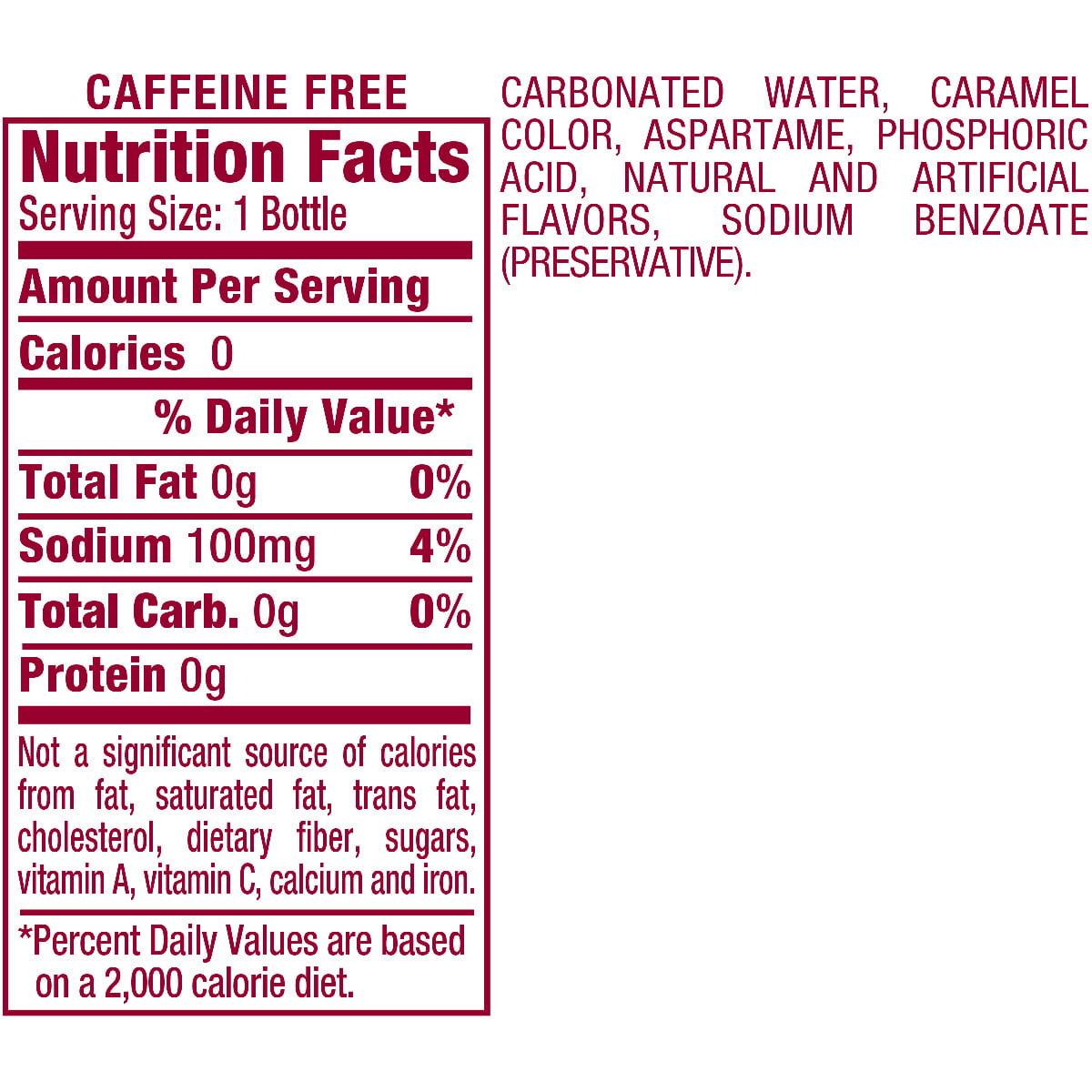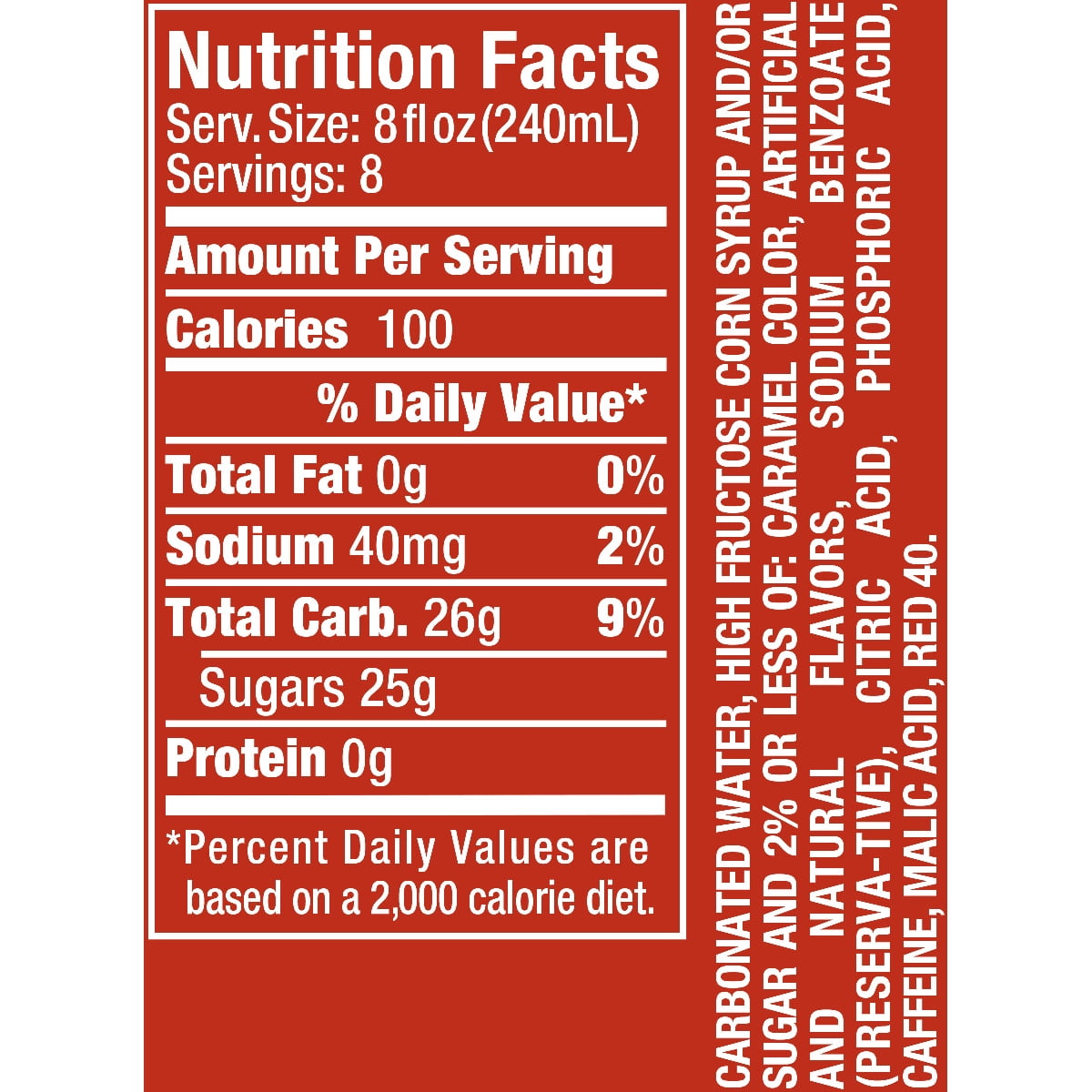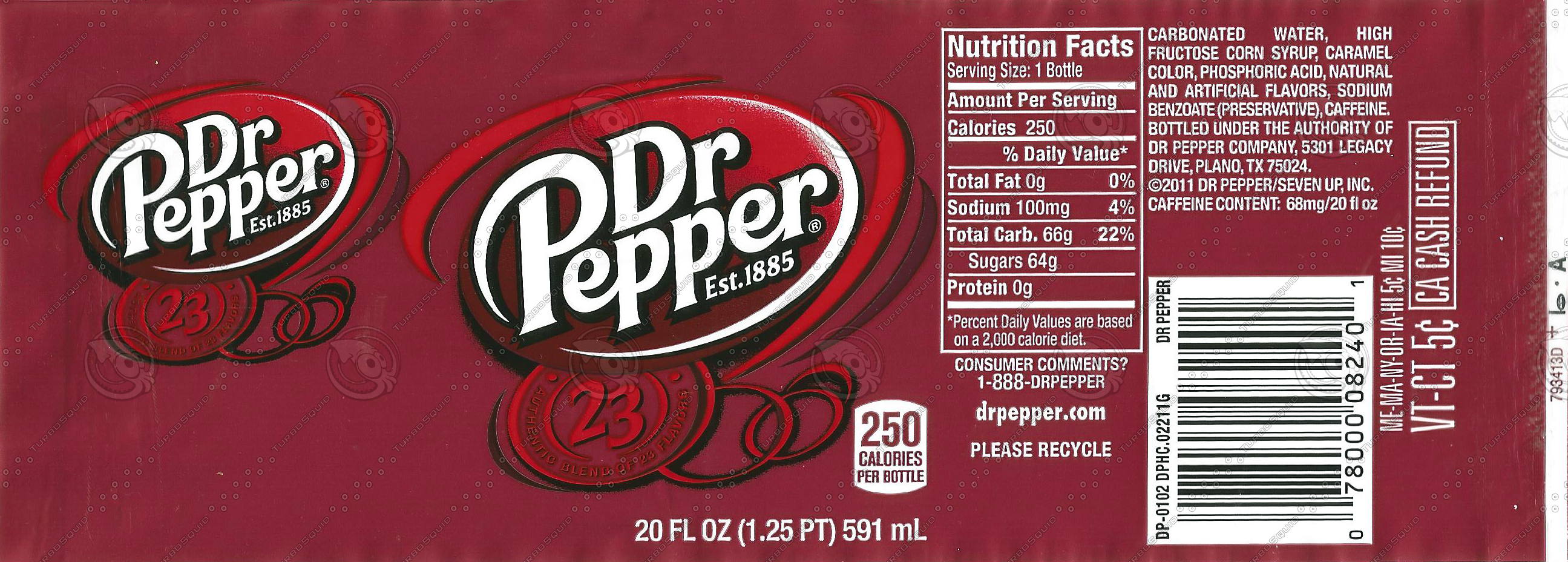Dr pepper food label – Delve into the depths of Dr Pepper’s food label, a treasure trove of information that unveils the ingredients, nutritional content, and potential health implications of this iconic beverage. From the essential Nutrition Facts Table to the intriguing ingredient list, this exploration unravels the complexities of Dr Pepper, empowering you to make informed choices about your beverage consumption.
As we embark on this journey, we’ll decipher the significance of each element on the food label, unraveling the mysteries behind Dr Pepper’s unique flavor profile and production process. Join us as we navigate the complexities of food labeling, examining the regulations and guidelines that shape the way Dr Pepper communicates its nutritional information to consumers.
Nutritional Facts Table

The Nutrition Facts Table is a crucial component of the Dr Pepper food label as it provides vital information about the nutritional content of the beverage.
As per FDA regulations, the table must include the following elements:
Serving Size
The serving size indicates the recommended amount of the product to be consumed. For Dr Pepper, the serving size is typically 12 fluid ounces (355 ml).
Calories
Calories measure the energy content of the beverage. A single serving of Dr Pepper contains 150 calories.
Nutrient Content
The table lists essential nutrients, including:
- Total Fat
- Saturated Fat
- Cholesterol
- Sodium
- Total Carbohydrates
- Dietary Fiber
- Total Sugar
- Protein
For example, a 12-ounce serving of Dr Pepper contains 41 grams of total carbohydrates, 40 grams of total sugar, and no protein.
Ingredient List
The ingredient list of Dr Pepper provides valuable insights into its unique flavor profile and production process. Let’s explore the primary ingredients and their functions, along with any unique or controversial ingredients used.
Primary Ingredients, Dr pepper food label
- Carbonated Water:The base of Dr Pepper, providing its effervescence and refreshing qualities.
- Sugar:Adds sweetness and contributes to the drink’s calorie content.
- Natural Flavors:A blend of 23 flavors that create Dr Pepper’s distinctive taste, including cherry, cola, vanilla, and citrus.
- Caramel Color:Gives Dr Pepper its characteristic dark brown color.
- Phosphoric Acid:Adds a tart flavor and acts as a preservative.
- Caffeine:Provides a stimulating effect.
Unique or Controversial Ingredients
- Aspartame:An artificial sweetener used in diet Dr Pepper, which has been the subject of some controversy regarding its safety.
- Potassium Benzoate:A preservative that has been linked to allergic reactions in some individuals.
li> Red 40:A food coloring that has been associated with hyperactivity in children.
Allergen Information

Individuals with food allergies or sensitivities rely heavily on accurate allergen labeling to make informed choices about the foods they consume. Dr Pepper, like many other food products, is required to disclose the presence of any major allergens on its food label to ensure consumer safety.
Common allergens, such as peanuts, tree nuts, milk, eggs, wheat, soy, fish, and shellfish, can trigger severe reactions in sensitive individuals. By providing clear and comprehensive allergen information, Dr Pepper empowers consumers to identify and avoid potential allergens, enabling them to make informed decisions that safeguard their well-being.
Potential Allergens in Dr Pepper
While Dr Pepper does not contain any of the eight major allergens listed above, it is essential to note that cross-contamination during manufacturing or handling processes is always a possibility. Therefore, individuals with severe allergies should exercise caution and consider contacting the manufacturer directly for further information.
Product Claims and Marketing
Dr Pepper’s food label presents various marketing claims, including its unique blend of 23 flavors and its iconic slogan, “King of Beverages.” These claims aim to create a distinctive brand identity and appeal to consumers’ taste preferences and nostalgia.
Food labeling and advertising in the United States are regulated by the Food and Drug Administration (FDA) to ensure accurate and truthful information. The FDA’s regulations require food labels to disclose nutritional content, ingredients, and potential allergens, while advertising must not be misleading or make false or exaggerated claims.
Marketing Strategies
Dr Pepper’s marketing strategies align with the information provided on its food label by highlighting its unique flavor profile and appealing to its loyal customer base. The company utilizes various advertising channels, including television commercials, print advertisements, and social media campaigns, to promote its brand and drive sales.
Dr Pepper’s marketing efforts emphasize the brand’s history, heritage, and its distinctive taste, which resonates with consumers who appreciate its classic appeal. The company also engages in cross-promotions and partnerships to expand its reach and appeal to new audiences.
Comparison to Other Beverages
Dr Pepper is a popular soft drink that has been enjoyed by consumers for over a century. However, it is important to be aware of the nutritional content of Dr Pepper and how it compares to other popular soft drinks and beverages.
The table below compares the nutritional content of Dr Pepper to other popular soft drinks and beverages.
Calories
| Beverage | Calories |
|---|---|
| Dr Pepper | 150 |
| Coca-Cola | 150 |
| Pepsi | 150 |
| Mountain Dew | 170 |
| Sprite | 140 |
| Apple Juice | 110 |
| Orange Juice | 110 |
| Water | 0 |
As you can see from the table, Dr Pepper has a similar number of calories to other popular soft drinks. However, it is important to note that Dr Pepper is a carbonated beverage, which means that it contains added sugar.
This added sugar can contribute to weight gain and other health problems.
Sugar Content
| Beverage | Sugar Content (grams) |
|---|---|
| Dr Pepper | 41 |
| Coca-Cola | 39 |
| Pepsi | 41 |
| Mountain Dew | 46 |
| Sprite | 38 |
| Apple Juice | 24 |
| Orange Juice | 21 |
| Water | 0 |
As you can see from the table, Dr Pepper has a higher sugar content than other popular soft drinks and beverages. This added sugar can contribute to weight gain, tooth decay, and other health problems.
Other Nutrients
| Beverage | Sodium (mg) | Potassium (mg) | Vitamin C (mg) |
|---|---|---|---|
| Dr Pepper | 45 | 20 | 0 |
| Coca-Cola | 45 | 20 | 0 |
| Pepsi | 45 | 20 | 0 |
| Mountain Dew | 50 | 25 | 0 |
| Sprite | 45 | 20 | 0 |
| Apple Juice | 0 | 110 | 10 |
| Orange Juice | 0 | 210 | 120 |
| Water | 0 | 0 | 0 |
As you can see from the table, Dr Pepper has a similar amount of sodium and potassium to other popular soft drinks and beverages. However, Dr Pepper does not contain any vitamin C.
The implications of these comparisons for consumers seeking healthier beverage options are clear. Dr Pepper is a high-calorie, high-sugar beverage that is not a good choice for those who are trying to lose weight or maintain a healthy weight. There are many other healthier beverage options available, such as water, unsweetened tea, and 100% fruit juice.
Label Design and Accessibility: Dr Pepper Food Label

The Dr Pepper food label showcases a well-structured design that adheres to industry standards for food labeling. It employs clear and concise language, ensuring the information is easily comprehensible to consumers.
Font Size and Color Contrast
The label utilizes a legible font size, enabling individuals with varying visual abilities to read the information effortlessly. Additionally, the contrasting colors between the text and background enhance the label’s accessibility, facilitating readability even for individuals with color vision deficiencies.
Answers to Common Questions
What is the serving size of Dr Pepper?
The serving size of Dr Pepper is 12 fluid ounces, as indicated on the Nutrition Facts Table.
Does Dr Pepper contain any allergens?
The Dr Pepper food label does not indicate the presence of any major allergens, such as peanuts, tree nuts, wheat, or dairy.
How much sugar is in Dr Pepper?
A 12-ounce serving of Dr Pepper contains 41 grams of sugar, which is approximately 82% of the recommended daily intake of added sugar.
Is Dr Pepper a healthy beverage choice?
Due to its high sugar content, Dr Pepper is not considered a healthy beverage choice. Regular consumption of sugary drinks has been linked to various health concerns, including weight gain, tooth decay, and chronic diseases.
What are the key ingredients in Dr Pepper?
The primary ingredients in Dr Pepper include carbonated water, high fructose corn syrup, natural flavors, caramel color, and phosphoric acid.
